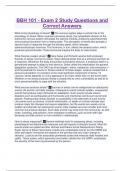BBH 101 - Exam 2 Study Questions and
Correct Answers
What is the physiology of stress? ✅The nervous system plays a central role in the
physiology of stress. When a person perceives stress, the sympathetic division of the
autonomic nervous system stimulates the adrenal medulla, producing catecholamines
and arousing the person from a resting state. The perception of stress also prompts a
second route of response through the pituitary gland, which releases
adrenocorticotropic hormone. This hormone, in turn, affects the adrenal cortex, which
produces glucocorticoids. These hormones prepare the body to resist stress.
What theories explain stress? ✅Hans Selye and Richard Lazarus both proposed
theories of stress. During his career, Selye defined stress first as a stimulus and then as
a response. Whenever the body encounters a disruptive stimulus, it mobilizes itself in a
generalized attempt to adapt to that stimulus. Selye called this mobilization the general
adaptation syndrome. The GAS has three stages—alarm, resistance, and exhaustion—
and the potential for trauma or illness exists at all three stages. Lazarus insisted that a
person's perception of a situation is the most significant component of stress. To
Lazarus, stress depends on one's appraisal of an event rather than on the event itself.
Whether or not stress produces illness is closely tied to one's vulnerability as well as to
one's perceived ability to cope with the situation.
What sources produce stress? ✅Sources of stress can be categorized as cataclysmic
events, life events, and daily hassles. Cataclysmic events include sudden, unexpected
events that produce major demands for adaptation. Such events include natural
disasters such as earthquakes and hurricanes and intentional events such as terrorist
attacks. Posttraumatic stress disorder is a possibility in the aftermath of such events.
Life events such as divorce, criminal victimization, or death of a family member also
produce major life changes and require adaptation, but life events are usually not as
sudden and dramatic as cataclysmic events. Daily hassles are even smaller and more
common but produce distress. Such daily events may arise from the community, as with
noise, crowding, and pollution; from workplace conditions, such as work with high
demands and little control; or from conflicts in relationships.
How is stress measured? ✅Several methods exist for assessing stress, including
physiological and biochemical measures and self-reports of stressful events. Most life
events scales are patterned after Holmes and Rahe's Social Readjustment Rating
Scale. Some of these instruments include only undesirable events, but the SRRS and
other self-report inventories are based on the premise that any major change is
stressful. Lazarus and his associates pioneered scales that measure daily hassles and
uplifts. These scales, which generally have better validity than the SRRS, emphasize
the severity of the event as perceived by the person.
, Physiological and biochemical measures have the advantage of good reliability,
whereas self-report inventories pose more problems in demonstrating reliability and
validity. Although most self-report inventories have acceptable reliability, their ability to
predict illness remains to be established. For these stress inventories to predict illness,
two conditions must be met: First, they must be valid measures of stress; second, stress
must be related to illness. Chapter 6 takes up the question of whether stress causes
illness.
What factors influence coping, and what strategies are effective? ✅Sources of stress
can be categorized as cataclysmic events, life events, and daily hassles. Cataclysmic
events include sudden, unexpected events that produce major demands for adaptation.
Such events include natural disasters such as earthquakes and hurricanes and
intentional events such as terrorist attacks. Posttraumatic stress disorder is a possibility
in the aftermath of such events.
Life events such as divorce, criminal victimization, or death of a family member also
produce major life changes and require adaptation, but life events are usually not as
sudden and dramatic as cataclysmic events. Daily hassles are even smaller and more
common but produce distress. Such daily events may arise from the community, as with
noise, crowding, and pollution; from workplace conditions, such as work with high
demands and little control; or from conflicts in relationships.
What behavioral techniques are effective for stress management? ✅Four types of
interventions are available to health psychologists in helping people cope with stress.
First, relaxation training can help people cope with a variety of stress problems. Second,
cognitive behavioral therapy—including stress inoculation and cognitive behavioral
stress management—is effective in reducing both stress and stress-related disorders
such as posttraumatic stress disorder. Third, emotional disclosure—including writing
about traumatic events—can help people recover from traumatic experiences and
experience better psychological and physical health. Fourth, mindfulness-based stress
reduction interventions can help reduce stress, depression, and anxiety.
What is a stressor? ✅Any event or situation that triggers coping adjustments to
perceived positive or negative stress
What is eustress? ✅From changes that are perceived as advantageous
What is distress? ✅From changes that are perceived as threatening
What is a stress response?
In the SNS?
In the PNS? ✅Physiological and psychological processes.
SNS: Mobilizes body for action in response to a stimulus/stressor - "fight or flight"
Involves immediate physiological responses and delayed hormonal responses
PNS: "Rest and digest", returns body to homeostasis, active under normal conditions




